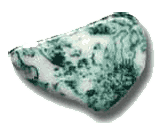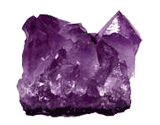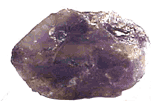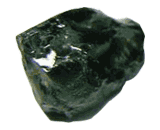| Gemstone Chart |
 Natural Agate Natural Agate
Agate is a beautiful natural chalcedony stone, classified as a semi precious gem and has been used by people as early as the ancient Egyptians in and before 3000 BC! Agate is hard and tough enough to be incorporated into jewelry and other ornamental items.
Color: Blue, green, yellow,orange, brown, gray
Categories: semi-precious stone
Chemical Composition: SiO2
Crystal Group: Hexagonal
Refractive Index: 1.530 - 1.539
Hardness: 6.5 - 7
Density: 2.57 - 2.64
Occurrence: Scotland, U.S.A., India, England, Italy, Brazil, Uruguay, Germany, Egypt, Indonesia, and many other localities.
|  Natural Amethyst Natural Amethyst
As a member of the quartz family, amethyst is one of the most common, hence under-appreciated, gemstones on the market.
Color: purple, violet
Categories: semi-precious stone
Chemical Composition: SiO2
Crystal Group: Hexagonal
Refractive Index: 1.544 - 1.553
Hardness: 7
Density: 2.66
Occurrence: Brazil, Uraguay, Bolivia, Madagascar, Russia, USA, Zambia
|  Natural Ametrine Natural Ametrine
Ametrine is a unique semi-precious gemstone that is a blend of citrine and amethyst.It has a warm, soft cream color that shows hints of both its lilac and honey hued parents.
Color: purple, violet, yellow
Categories: semi-precious stone
Chemical Composition: SiO2
Crystal Group: Hexagonal
Refractive Index: 1.544 - 1.553
Hardness: 7
Density: 2.66
Occurrence: Brazil, Bolivia
|  Natural Aquamarine Natural Aquamarine
Aquamarine is a semi-precious gemstone frequently incorporated into some of the most modern, beautiful handmade jewelry in the world. It is most often found in shades of clear ocean blue, and is widely recognized as the March Birthstone and the gemstone for the 18th anniversary.
Color: Blue, Green-blue
Categories: semi-precious stone
Chemical Composition: Be3Al2(SiO3)6
Crystal Group: Hexagonal
Refractive Index: 1.577(+-.016), 1.583 (+-.017)
Hardness: 7.5
Density: 2.67-2.745
Occurrence: Brazil, China, India, Madagascar, Mozambique, Russia, and U.S.A.
|  Natural Beryl Natural Beryl
Beryl is a semi-precious clear gemstone which usually comes in greens, yellows, and occasionally pinks, ands various shades thereof.
Color: Green, blue, pink, yellow, red
Categories: semi-precious stone
Chemical Composition: Be3Al2(SiO3)6
Crystal Group: Hexagonal
Refractive Index: 1.577(+-.016), 1.583 (+-.017)
Hardness: 7.5
Density: 2.67-2.745
Occurrence: Austria, Columbia, Brazil, Russia, East Africa, Australia, Madagascar, South Africa, Zimbabwe, India, Pakistan, Zambia, Nigeria, U.S.A., Afghanistan
|  Natural Bi Color Tourmaline Natural Bi Color Tourmaline
Bi color tourmaline is the name given to tourmaline which displays more than one color in the same cystal.It is classified as a semi-precious stone.
Color: Green, red, yellow, orange. Brown, green, pink
Categories: semi-precious stone
Chemical Composition: (NaCa)(LI,MgFe,Al)9B3Si6(O,OH)31
Crystal Group: Hexagonal
Refractive Index: 1.624(+.005, -.005) - 1.644(+.006, -.006)
Hardness: 7-7.5
Density: 3.06 (.05, +.15)
Occurrence: East Africa, Brazil, USA, Afghanistan, Nigeria, Madagascar
|  Natural Chalcedony Natural Chalcedony
Chalcedony is a catch all term that includes many well known varieties of cryptocrystalline quartz gemstones. They are found in all 50 States, in many colors and color combinations, and in sedimentary, igneous, and metamorphic rocks.
Color: grayish, purple, white, green, blue, lavender, yellow, brown
Categories: semi-precious stone
Chemical Composition: SiO2
Crystal Group: Hexagonal
Refractive Index: 1.530 - 1.539
Hardness: 6.5
Density: 2.57 ĘC 2.64
Occurrence: Brazil, U.S.A. Germany, India, Uruguay, Austarlia, Egypt, Italy, Scotland, South Africa, Namibia, Madagascar, Mexico, Tanzania, and many other localities throughout the world.
|  Natural Indicolite Natural Indicolite
Indicolite is a very beautiful stone which is also known as "Blue Tourmaline". It is much different from the other gemstones found in the world.
Indicolite is one of the rarer varieties of elbaite.
Color: Blue
Categories: semi-precious stone
Chemical Composition: (NaCa)(LI,MgFe,Al)9B3Si6(O,OH)31
Crystal Group: Hexagonal
Refractive Index: 1.624(+.005, -.005) - 1.644(+.006, -.006)
Hardness: 7-7.5
Density: 3.06 (.05, +.15)
Occurrence: Brazil, Namibia, U.S.A.
|
|
